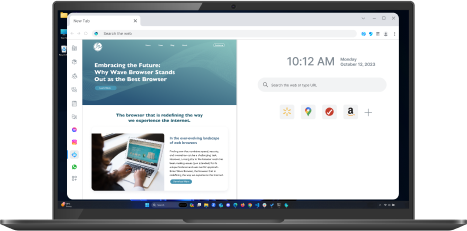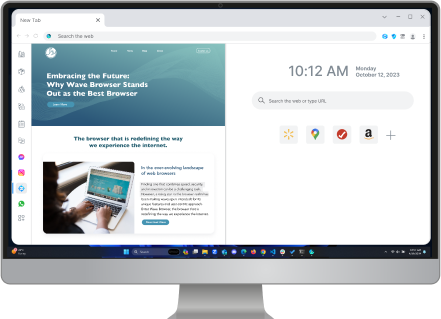Safeguard Your Online Privacy: The Power of Adblocking
Table of Contents
Protecting online privacy has never been more imperative. Our digital lives are intertwined with personal data, including email addresses and credit card numbers, leaving us vulnerable to prying eyes and online threats such as identity theft and data breach, like those that have occurred several times on Google Chrome. We have no room to make internet privacy mistakes.
Despite the internet's numerous conveniences, it also harbors malicious code, cybercriminals, and scam artists. The dark web, in recent years, has gained notoriety for illegal activities, including the illicit sale of stolen personal information. This alarming trend underscores the necessity of taking proactive measures like browser extensions and ad blockers to fortify your online privacy and following safe browsing tips.
Protecting Your Privacy with Adblocking
While online browsing, we are often bombarded with unwanted ads. An ad block browser, like AdBlock Plus, provides an effective solution for shielding your privacy and sensitive information. In this blog post, we will delve into the advantages of adblockers and their role in thwarting browser trackers, ultimately safeguarding online privacy and allowing only acceptable ads.
Additionally, we'll share cybersecurity tips for those eager to fortify the protection of their personal data and skip video ads. To top it off, we'll introduce our preferred ad blocker browser and explain why it stands out as the optimal choice for bolstered online privacy and data security. Skip to the bottom to get your free adblock browser download.
Can Adblockers Protect Online Privacy?

Yes. Adblockers are tech-savvy solutions designed to do more than just block annoying and invasive ads. They play a crucial role in preventing trackers from monitoring your online activities, thus protecting your personal data from malicious attackers, third-party trackers, and prying eyes.
Benefits of Using Adblockers to Protect Online Privacy
If you use a popular browser like Microsoft Edge, using adblockers can provide several key advantages that help you protect online privacy. Let's take a look at the most important ones!
1. Block Browser Trackers and Cross-Site Tracking

Third parties, including advertisers and websites, use ad trackers to monitor your online behavior, from the search engine queries you make to the products you browse and the websites you visit. Adblockers protect online privacy by interrupting this process and preventing these trackers from loading, thereby maintaining your internet privacy.
- Blocking Tracking Cookies: Ad blockers can block the cookies that websites and advertisers use to track your online behavior. By preventing these cookies from being set, ad blockers reduce the data that can be collected about your online activities.
- Halting Tracking Scripts: Many tracking is done through JavaScript and other scripts. Ad blockers can prevent the execution of these tracking scripts, reducing the ability of websites to monitor your online behavior.
- Filtering Third-Party Requests: Ad blockers often block requests to third-party domains, which are commonly used for tracking. By blocking these requests, they disrupt the flow of data between your device and tracking services.
- Limiting Cross-Site Tracking: Ad blockers can limit the ability of websites to share your data with third-party advertisers and data brokers, making it more challenging to create comprehensive profiles of your online activities.
2. Ad Blockers Protect You from Phishing Attacks:

Ad blockers can protect online privacy and keep users safe from phishing attempts through the following:
- Blocking malicious ads: Ad blockers prevent the display of deceptive ads that often lead users to phishing websites. By filtering out these ads, they reduce the likelihood of encountering fraudulent links.
- Reducing clickbait content: Ad blockers can recognize and block clickbait-style ads that lure users with sensational headlines. This helps users avoid falling for phishing traps hidden behind tempting offers or news stories.
- Preventing malicious pop-ups: Many phishing attempts use pop-up ads to create a sense of urgency or alarm. Ad blockers suppress these pop-ups, preventing users from clicking on them and exposing themselves to phishing risks.
3. Ad Blockers Provide Faster Browsing:

Did you know that it can also improve page load time? In fact, ad blockers can make a browser faster in several ways:
- Reduced Page Loading Time: Advertisements often consist of large media files and scripts, which can significantly slow down the loading of web pages. Ad blockers prevent these elements from loading, leading to quicker page loading times.
- Lower Data Usage: By blocking ads, ad blockers reduce the amount of data that needs to be downloaded when visiting a website. This not only speeds up page loading but also conserves data usage.
- Less CPU and Memory Usage: Ads and tracking scripts can consume significant amounts of your device's CPU and memory resources. Ad blockers prevent these resource-intensive processes from running, leading to a smoother browsing experience and faster responsiveness.
4. Ad Blockers Reduce Malware and Adware Risk:

Ad blockers and ad blocker browsers protect online privacy and contribute to reduced malware risk by preventing malicious ads and scripts from being displayed on web pages. Here's how they help mitigate this risk:
- Blocking Malicious Ads: Ad blockers are designed to recognize and block ads that have been flagged as malicious or potentially harmful. These ads often contain malware or lead to malicious websites. By preventing these ads from loading, ad blockers reduce the risk of users accidentally clicking on them.
- Blocking Script Execution: A browser with ad blocking will often block not only ads but also the tracking and scripting elements associated with them. Many malware infections occur through malicious scripts that exploit vulnerabilities in a user's browser. Ad blockers restrict the execution of these scripts, reducing the potential attack surface.
5. Ad Blockers Come With Customizable Filters:

The best ad block browser protect online privacy with customizable filters that give users greater control over the content they see and the data they share. Here's how filters help enhance online privacy:
- Whitelisting Trusted Sites: An adblock web browser with custom filters lets users whitelist websites they trust and want to support.
- Reducing Exposure to Potentially Harmful Content: Customizable filters allow users to tailor their ad blocker's settings to minimize their exposure to content they find potentially harmful or objectionable, enhancing their online experience.
6. Ad Blockers Offer More Privacy on Android and iOS Mobile Devices:

The easiest way to protect your online experience is by getting a browser with built in adblock. Ad blockers improve digital privacy on Android and iOS mobile devices by blocking tracking cookies, preventing location tracking, and enhancing app privacy. They also block malicious ads, reduce data usage, and speed up browsing while providing customizable filters for more control. Just be sure to read the adblock reviews before choosing one that best fits your needs.
Cybersecurity Tips to Protect Your Online Privacy
1. Create Strong and Unique Passwords

The key aspects of a strong password are length (the longer the better); a mix of letters (upper and lower case), numbers, and symbols, no ties to your personal information, and no dictionary words. It's also recommended to use identity theft protection tools and secure methods like fingerprint authentication or a password manager to store and protect your passwords and other sensitive information.
2. Avoid Oversharing on Twitter, Facebook and Other Social Media Apps

The first thing most of us do when we wake up is to check our favorite social media sites for the latest news, but these sites are prime targets for attackers since they store our personal info such as phone numbers, email accounts, user names, and other credentials. With so much at risk, it's important to have the right security solutions to protect your sensitive information.
For starters, adjust your privacy settings since maintaining the default settings is typically not in your best interest. Additionally, using an ad blocker helps enhance privacy on our smartphones and social media apps like Twitter and Facebook by preventing tracking, reducing intrusive ads, and improving overall app performance. They also minimize the risk of data leaks and exposure to potentially harmful content.
3. Use Public Wi-Fi Internet With Caution

Using public Wi-Fi networks requires caution due to various security risks. When you access public Wi-Fi, you may expose personal information, like usernames and passcodes, to potential hackers who can use spyware to intercept your data. This puts your online shopping accounts at risk and could lead to unauthorized access to modern services like Google, Microsoft, or even financial apps.
Hackers can also set up rogue Wi-Fi networks to trick users into connecting. Once connected, they can access your folders and files, potentially compromising sensitive data. Always be cautious and make sure your web browsers, like Chrome and Firefox, have the latest security updates to guard against vulnerabilities.
4. Beware of Suspicious Email Links and Attachments

Most cybersecurity experts advise against clicking on any suspicious links in your email, as these are often the source of malicious phishing attacks. To enhance email and password security, it is essential to mitigate phishing risks by blocking fake login pages within phishing ads and minimizing the potential for malware infection through malicious ads. Additionally, insider threat monitoring can help organizations detect and prevent internal security breaches, providing an extra layer of protection.
5. Make Sure to Visit Secure HTTPS Websites

Visiting HTTPS sites is crucial for online security because it ensures that your data is transmitted over a secure, encrypted connection. This encryption protects your sensitive information, such as login credentials and personal details, from being intercepted by malicious actors. It also helps verify the authenticity of the website, reducing the risk of falling victim to phishing attacks or other online scams.
6. Consider Using a VPN and Two-Factor Authentication

Whether you browse the web on a laptop, Mac, or mobile device, to further protect online privacy you should consider using two-factor authentication (2FA) and a Virtual Private Network (VPN) along with your ad blocker. VPNs are useful for unblocking restricted browsers, but do much more than just that.
2FA adds an extra layer of protection by requiring you to provide a second authentication factor, such as a code from a mobile app, in addition to your unique password. Using the best ad blocker for Chrome or any other private browser encrypts your internet connection, making it more difficult for attackers to intercept your data. Combining these two measures strengthens your online defenses, ensuring that even if your password is compromised, your data remains secure.
Adding a QR code feature to your 2FA setup can streamline the authentication process, allowing you to quickly scan and verify your identity with compatible mobile apps. Combining these two measures strengthens your online defenses, ensuring that even if your password is compromised, your data remains secure. Browser Privacy extensions are also great resources.
7. Use BiteDefender Digital Identity Protection

Take control of your online privacy, with Bitdefender Digital Identity Protection. This helpful software scans the web for unauthorized leaks of your personal data, monitoring if your accounts are exposed and making it easy to take action well before disaster strikes.
Download Wave Browser's Powerful Ad Blocker
Protecting online privacy is more important than ever. Adblockers are powerful tools that not only rid your online experience of annoying targeted ads but also serve as an effective shield against trackers, invasive ads, and potential threats like identity theft and data breach.
Take control of your online experience with Wave Browser's free adblocker browser. Keep your online activities secure and your personal information private with the best ad blocker. Make the switch today to enjoy a safer and more private internet experience with Wave’s free ad blocker browser. Your digital security and peace of mind are worth it.
Remember, in this era of advanced technology and increasing online threats, a little precaution can go a long way in preserving your online privacy and keeping your personal data safe from prying eyes. Stay safe, stay private, and make adblocking a part of your digital defense strategy.
Surf with Ease, Speed, and Security!

Download Wave Browser for a seamless online experience like never before. Try it now!













